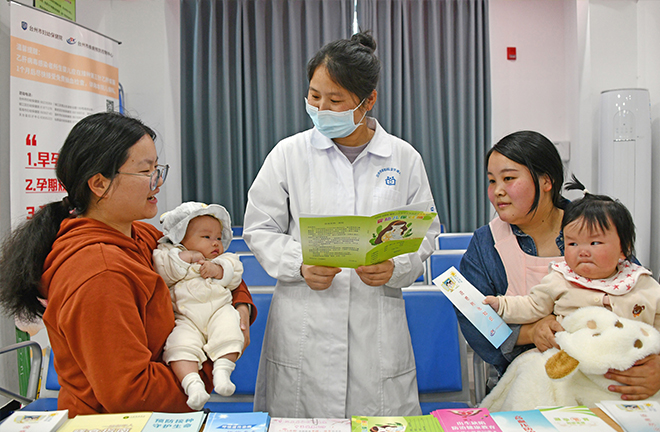Introducing a ‘degendered’ perspective into China’s family policy

Medical staff at a community health service center in Xianju County, Taizhou City, Zhejiang Province, explain childcare and healthcare knowledge to local residents. Photo: IC PHOTO
A longstanding debate in the field of family policy centers on a fundamental question: should policy strengthen family responsibilities, or should it liberate individuals from them? Those who advocate for “familialization” argue that policies should reinforce families’ caregiving responsibilities for children and the elderly, thereby consolidating family structures and relationships. Conversely, proponents of “defamilialization” contend that caregiving duties should be increasingly assumed by society and the market, freeing individuals—particularly women—from the constraints of family roles. In recent years, the concept of “degenderization” has introduced a new dimension to this debate: family policy should not only balance family and state responsibilities but also contribute to the elimination of gender inequality.
It should be noted that although the term “family policy” is rarely used explicitly in China’s official policy documents, many policies—such as maternity leave, parental leave, childcare services, and individual tax deductions for elderly care expenses—directly target and impact families. Chinese scholars generally refer to such policies as “family policies,” a term also adopted in this article.
Familialization vs. defamilialization
The core idea of defamilialization is to shift responsibility for individual welfare from families to the public sector. This orientation is typically reflected in the development and improvement of social welfare systems, as exemplified by China’s recent efforts to provide universal childcare services for children aged 0-3, build more elderly care facilities, and improve community-based elderly care services. These measures not only enable women to participate more fully in the workforce but also help younger and older generations to live more independently. Defamilialization is considered a hallmark of the modern welfare state, highlighting the role of public service and social responsibility in offsetting the decline of traditional family functions.
Defamilialization can be seen as a critique of familialization, an approach by which governments encourage family members—often stay-at-home mothers or adult children—to care for the elderly and young children through economic incentives and welfare support. Such policies may not only increase families’ caregiving burden but also undermine the employment prospects of family caregivers, who are disproportionately women. In China, where families have historically borne the primary responsibility for raising children and supporting the elderly, often with limited external support, defamilialization is a well-justified policy direction. However, the expansion of public services entails significant fiscal costs, requiring policymakers to strike a careful balance between reducing the burden on families and maintaining fiscal sustainability.
Degenderization: a new approach
Building on the debate over familialization and defamilialization, scholars have proposed the concept of degenderization, which seeks to eliminate gender-based role divisions and stereotypes within households and society to ensure equal opportunities and support for both men and women in fulfilling family responsibilities and participating in the economy.
Degenderization is regarded as a key complement to existing family policies, as it addresses the gendered power structures and cultural assumptions embedded within them. Traditional family policies often presuppose a “male breadwinner, female homemaker” model. Policies prioritizing the former may increase women’s caregiving burden, while those emphasizing the latter could further disadvantage women in the labor market.
Rather than narrowly debating who should provide care, the degendered approach poses a deeper question: “How can both men and women benefit equally from policies and share family responsibilities on an equal footing?” This reframing expands the focus of family policy research beyond the binary state-family relationship to include intra-household gender dynamics. Degenderization also serves to remind policymakers that the aim of family policy should not be limited to raising fertility rates, but must also include the promotion of gender equality. Similarly, researchers should avoid evaluating policies solely based on their impact on reproductive behavior.
While degenderization serves as a new perspective on family policy, it also poses challenges. In China, defamilialization remains underdeveloped, and state support for families needs to be further strengthened. Furthermore, while degenderization makes the case for equal participation in employment and family responsibilities, entrenched gender inequalities persist. Systemic reforms in social norms and workplace culture are essential to prevent the emergence of new problems.
Zhong Xiaohui is an associate professor from the School of Government at Sun Yat-sen University.
Edited by WANG YOURAN
